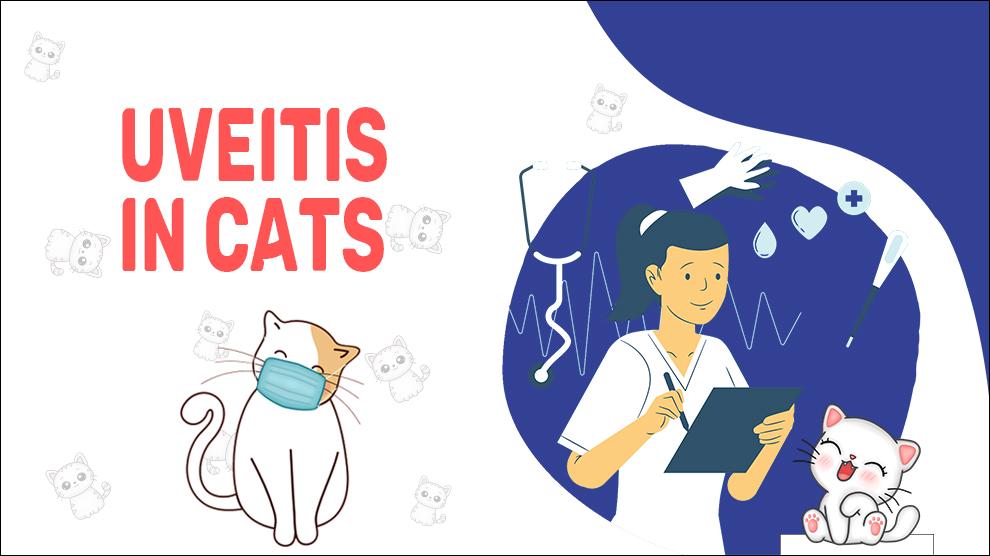What Is Uveitis In Cats?
Uveitis is an inflammatory condition that affects the uveal tract of the eye, which includes the iris, ciliary body, and choroid.
It is a serious condition that can lead to vision loss or blindness if left untreated. Uveitis can occur in cats of all ages and breeds, and it can have various underlying causes.
Clinical Signs Of Uveitis In Cats
The symptoms of uveitis in cats can vary depending on the severity and underlying cause of the condition.
Some common symptoms include:
- Redness of the eye
- Squinting or closing of the eye
- Excessive tearing
- Cloudiness or haziness of the eye
- Sensitivity to light
- Swelling of the eye or eyelids
- Discharge from the eye
- Changes in the shape or size of the pupil
- Inability to see in low light or darkness
- Rubbing or pawing at the eye
- Shut Eye
- Excessive Blinking
- Bumping Into Things
Treatment Options For Uveitis In Cats
The treatment of uveitis in cats depends on the underlying cause of the condition. If uveitis is caused by an infection, such as FIP or FHV, antiviral medications may be prescribed to treat the infection.
If uveitis is caused by an autoimmune disorder, immunosuppressive medications may be used to reduce inflammation.
Pain medications may also be prescribed to manage any discomfort associated with uveitis. In some cases, surgery may be necessary to remove a cancerous tumor or repair damage to the eye.
Home Remedies For Uveitis In Cats
While there are no specific home remedies for uveitis, there are some general tips you can follow to help keep your cat's eyes healthy and prevent eye infections:
- Keep your cat's living area clean: This includes litter boxes, bedding, and food and water dishes. Regularly clean and disinfect these areas to reduce the risk of bacterial or viral infections that can affect the eyes.
- Avoid irritants: Keep your cat away from smoke, dust, and other irritants that can cause eye irritation and inflammation.
- Regular grooming: Grooming your cat regularly can help to keep their eyes clean and free of debris. If your cat has long hair around their eyes, consider trimming it to prevent it from irritating their eyes.
- Provide a healthy diet: Feeding your cat a balanced and nutritious diet can help to keep their immune system strong and reduce the risk of infections.
How To Prevent Uveitis In Cats?
Preventing uveitis in cats can involve taking preventive measures against infectious diseases that can lead to uveitis, such as FIP, FeLV, and FHV.
Keeping your cat's vaccinations up to date and practicing good hygiene can also help prevent the spread of infectious diseases.
Regular veterinary checkups can help detect any underlying conditions that may increase the risk of uveitis, such as autoimmune disorders or cancer.
Avoiding exposure to toxins and keeping your cat away from dangerous areas, such as construction sites or busy roads, can also reduce the risk of trauma and eye injuries.
Affected Cat Breeds Of Uveitis
Uveitis can occur in cats of any breed, age, or gender.
Causes For Uveitis In Cats
Causes:
Uveitis can be caused by various factors, such as infections, trauma, autoimmune disorders, cancer, or exposure to toxins.
Some common causes of uveitis in cats include:
- Feline infectious peritonitis (FIP)
- Feline leukemia virus (FeLV)
- Feline immunodeficiency virus (FIV)
- Feline herpesvirus (FHV)
- Toxoplasmosis
- Bartonella infection
- Trauma to the eye or head
- Cancer, such as lymphoma or melanoma
- Systemic autoimmune diseases, such as systemic lupus erythematosus (SLE)
- Exposure to toxins, such as pesticides or heavy metals
When To See A Vet For Uveitis In Cats?
If you notice any of the symptoms of uveitis in your cat, it is essential to take them to the veterinarian immediately.
Uveitis can cause severe discomfort, pain, and vision loss if left untreated. An eye examination and diagnosis by a veterinarian are necessary to determine the cause of the uveitis and to start appropriate treatment.
Food Suggestions For Uveitis In Cats
There are no specific foods that are known to prevent or treat uveitis in cats.
However, feeding your cat a healthy and balanced diet that includes high-quality protein and essential vitamins and minerals can help to keep its immune system strong and reduce the risk of infections.
Conclusion
Uveitis is a serious condition that can cause discomfort, pain, and vision loss in cats. It is essential to take your cat to the veterinarian if you notice any of the symptoms of uveitis.
With prompt diagnosis and treatment, most cats can make a full recovery. While there are no specific home remedies for uveitis, you can take steps to keep your cat's eyes healthy and prevent eye infections.
Feeding your cat a healthy and balanced diet can also help to keep its immune system strong and reduce the risk of infections.











